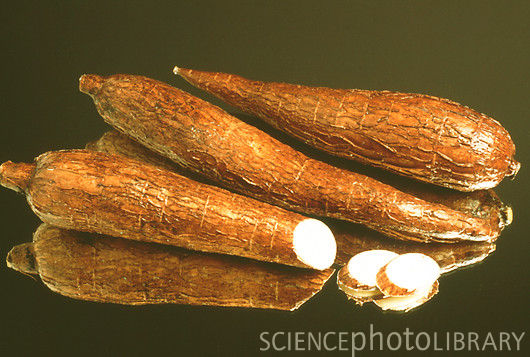一项研究发现,非洲小规模农业社区内部的婚姻可能影响木薯的遗传多样性。木薯是一种广泛种植的农作物,它的含大量淀粉且可食用的根常常被称为木薯。

婚姻交流方式或影响木薯遗传多样性
Marc Delêtre及其同事调查了非洲加蓬的10个社区的婚姻交流和种子交换网络之间的关系。这组作者收集了每个村庄种植的木薯品种并测定了基因型,结果他们发现木薯的遗传多样性在截然不同的地理区域群聚,在该国的南方发现了最大的遗传多样性,在北方发现的遗传多样性最低。
研究人员提出,木薯多样性的地区差异可能部分反映了这两个地区的婚姻风俗:在南方,新娘嫁到丈夫的村子并且从娘家的农场带来木薯品种,而在北方,新娘空手出嫁并且获得来自她们的岳母的木薯品种。
他们还提出,这个结果是女性向北方流动并没有伴随着木薯的新品种流向北方。理解婚姻交流和种子交换可能有助于破解农作物多样性的地理模式。(生物探索)
相关英文论文摘要:
Marriage exchanges, seed exchanges, and the dynamics of manioc diversity
The conservation of crop genetic resources requires understanding the different variables—cultural, social, and economic—that impinge on crop diversity. In small-scale farming systems, seed exchanges represent a key mechanism in the dynamics of crop genetic diversity, and analyzing the rules that structure social networks of seed exchange between farmer communities can help decipher patterns of crop genetic diversity. Using a combination of ethnobotanical and molecular genetic approaches, we investigated the relationships between regional patterns of manioc genetic diversity in Gabon and local networks of seed exchange. Spatially explicit Bayesian clustering methods showed that geographical discontinuities of manioc genetic diversity mirror major ethnolinguistic boundaries, with a southern matrilineal domain characterized by high levels of varietal diversity and a northern patrilineal domain characterized by low varietal diversity. Borrowing concepts from anthropology—kinship, bridewealth, and filiation—we analyzed the relationships between marriage exchanges and seed exchange networks in patrilineal and matrilineal societies. We demonstrate that, by defining marriage prohibitions, kinship systems structure social networks of exchange between farmer communities and influence the movement of seeds in metapopulations, shaping crop diversity at local and regional levels.
英文论文链接:https://www.pnas.org/content/early/2011/10/24/1106259108.abstract







